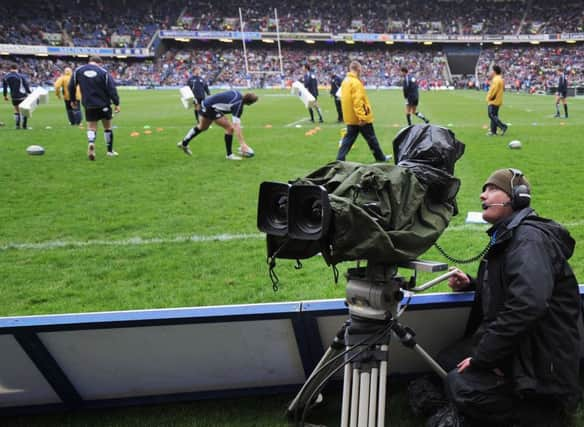Extra terrestrial help for Six Nations on TV


Earlier this year the BBC lost the live coverage rights for golf’s Open Championship from 2017 onwards and only last week the national broadcaster was denied the exclusive rights to the 2022 and 2024 Winter and Summer Olympics by a near £1 billion bid by the owners of Eurosport. That meant the BBC will have to sub-let a more limited package of live Games coverage.
There had been fears that the Six Nations, which is in the BBC’s hands until 2017, could be lost to Sky Sports from the following year but it is believed a successful approach for help from commercial rivals ITV has led to a £50m-a-year bid cobbled together to keep it out of the satellite channel’s grasp.
Advertisement
Hide AdAdvertisement
Hide AdThat would mean that the 15 matches that make up each annual tournament being shared by the two terrestrial channels. ITV Sport has had the rights for the Rugby World Cup since 1991.
There were suggestions yesterday that some Celtic unions, especially Scotland, were understood to be more open to seeing the tournament on Sky or BT Sport if it means more income for them.
That would make sense considering the ever-closer and lucrative association between BT Sport and the Scottish Rugby Union. The telecommunications giant and digital sport network is the main sponsor of the SRU, signing a four-year deal last May thought to be worth in the region of £20m, which includes naming rights to Murrayfield Stadium, backing for the new BT Sport Scottish Rugby Academy system and shirt sponsorship of the national and professional club teams.
While the BBC is viewed as the traditional home of the Five and Six Nations over the years, with the late Bill McLaren becoming an iconic figure known as the Voice of Rugby through his long association with the channel, there was a period in the late 1990s and early 2000s when Sky, which has been the home of British and Irish Lions tour coverage since 1997, had exclusive rights to England home games in the championship.
At this stage, the RFU is believed to see the benefits of having bigger viewing figures and a higher-profile by keeping the Six Nations on terrestrial TV, while teaming up with Sky for their summer tours and autumn internationals.
Cuts to the BBC’s budget have clearly put its sports output under pressure but Labour’s shadow sports minister Clive Efford yesterday claimed that it would be a “huge mistake” for the Six Nations to be limited to pay TV.
An announcement is expected this afternoon and sources with knowledge of the negotiations have confirmed the BBC and ITV have been working on a combined bid.
Efford warned of a backlash if there is no coverage on BBC or ITV. He said: “I have made inquiries and I understand this is a serious bid from the BBC and ITV and one to be welcomed.
Advertisement
Hide AdAdvertisement
Hide Ad“It’s healthy for sports to have some of their elite events on terrestrial TV and rugby needs to have access to a platform that is accessible to everyone if it wants to grow and inspire the next generation. I think if the Six Nations followed the elite club competitions and England’s autumn internationals on to pay TV there would be a backlash and pressure would be put on politicians to put it on the A-list of sporting events.”
At present there are certain events which, by law, must be shown live on free-to-air television, which are known as the “Crown Jewels”. These are the Olympic Games, FIFA World Cup and European Championship finals, English and Scottish FA Cup finals, the Grand National and the Derby horse races, Wimbledon, rugby union’s World Cup final and rugby league’s Challenge Cup final.
There is a B-list of events which must at least have delayed terrestrial highlights, which includes the Six Nations as well as England Test cricket matches, all other matches in Rugby World Cup finals, the Open, Ryder Cup, Cricket World Cup, Commonwealth Games and World Athletics Championships. Efford claimed the government’s cuts to the BBC meant it was inevitable it would struggle to secure sports rights in the future.
“The threat of these huge cuts is that things we have seen on BBC may come to an end as they don’t have the commercial possibility to increase revenue. That’s a serious problem and could have dire consequences.
“It is therefore a sensible move by terrestrial TV stations to work together.”
This year’s ‘Super Saturday’ climax to the Six Nations Championship won the BBC record viewing figures when a peak audience of 9.63m tuned in to see England narrowly fall short of winning the title despite beating France in a 55-35 thriller. The earlier matches in the day, including eventual champions Ireland’s victory in Scotland and Wales’ win in Italy, attracted figures of 5.1m and 4.6m respectively.